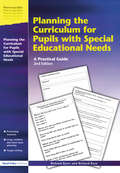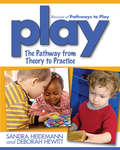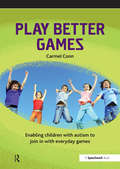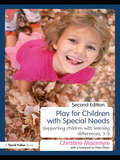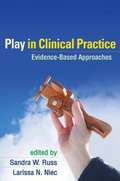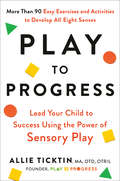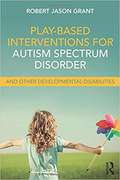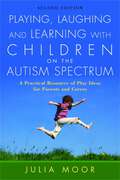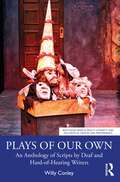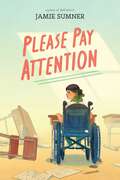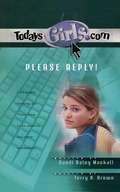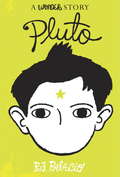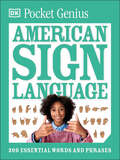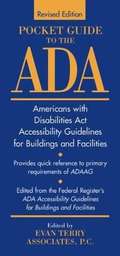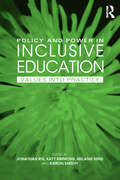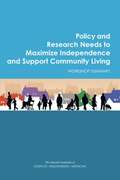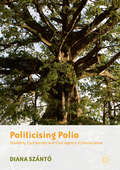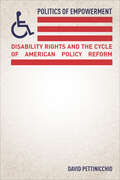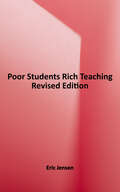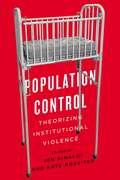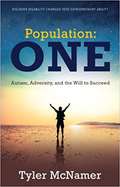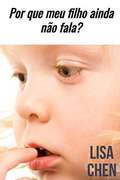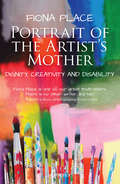- Table View
- List View
Planning the Curriculum for Pupils with Special Educational Needs: A Practical Guide (Resource Materials for Teachers)
by Richard Rose Richard ByersThis second edition is revised and updated to take full account of recent developments in special needs. The core of the book focuses on planning for well-differentiated curriculum implementation. It describes a variety of models that explore progression, continuity, relevance and inclusion for pupils with special educational needs. The authors also offer an analysis of curriculum management issues in the light of the theoretical and statutory background since the latest revisions of the National Curriculum and the Code of Practice.
Platypus and Fly: Targeting l Blends (Speech Bubbles 2)
by Melissa PalmerFly is sneaky and very cheeky. He likes to tease and annoy other creatures around him. Then he meets Platypus, who is ready for lunch. The race is on, but who will win? This picture book targets /l/ blends and is part of Speech Bubbles 2, a series of picture books that target specific speech sounds within the story. The series can be used for children receiving speech therapy, for children who have a speech sound delay/disorder, or simply as an activity for children’s speech sound development and/or phonological awareness. They are ideal for use by parents, teachers or caregivers. Bright pictures and a fun story create an engaging activity perfect for sound awareness. Picture books are sold individually, or in a pack. There are currently two packs available – Speech Bubbles 1 and Speech Bubbles 2. Please see further titles in the series for stories targeting other speech sounds.
Play
by Deborah Hewitt Sandra HeidemannPlay skills are life skills; as children develop them, they also learn important social skills that they will use throughout their lives. Teachers will find successful strategies for implementing changes in the classroom to enhance the environment for play and techniques to help support children's development. This is the revised edition of the well-respected and relied-upon handbook Pathways to Play. Play contains activity ideas that encourage play skills, checklists to help identify where children are having problems, specific teaching strategies, and assessment options. This new edition also examines how play theory translates into practice.
Play Better Games: Enabling Children with Autism to Join in with Everyday Games
by Carmel ConnOrdinary games are an important vehicle for children's learning. They provide a powerful, naturally occurring learning environment that is physical, playful and fun. Playing games requires interpersonal skills in language, thought, social behavior, creativity, self-regulation and skilful use of the body. When children play games together they develop the following key capacities:•Cooperative behavior•Focused attention•Social understanding•Holding information in mind•Motor, spatial and sequential planning•Self-regulation, e.g impulse control, coping with excitement, controlled exertion•Collaborative behavior and negotiation•Self-expression and creativity.Games provide a social experience that is emotionally compelling, where children laugh and have fun and do not realise they are interacting, problem solving, negotiating and cooperating with each other.Play Better Games is designed to help practitioners and parents to think about what might prohibit their children from joining in with games and plan effective strategies for support. It will be of benefit to teachers, therapists, group works, play workers, midday supervisors and support workers, as well as to parents and siblings of children with autism.
Play for Children with Special Needs: Supporting children with learning differences, 3-9
by Christine MacintyreThere are many more children with learning differences and difficulties in our schools today. Their needs are varied and complex and professionals must find appropriate ways to enhance their learning. The value of play is endorsed in policy initiatives including The Early Years Foundation Stage curriculum, so professionals can be reassured that ‘more time to play’ is in line with the latest thinking. Christine Macintyre emphasises the importance of creating an environment where children become confident, independent learners, increasingly able to use their imaginations, care for others and to take safe risks. This fully revised edition of Play for Children with Special Needs includes new research findings and explains their implications for practice. This book then enables those supporting children to: understand the benefits of play and how to adapt different scenarios to support children who do not find it easy to play observe children as they play so that any difficulties can be identified early analyse different play areas so that the different kinds of learning (intellectual, creative, motor, social and emotional) are appreciated. Play for Children with Special Needs, 2nd edition enables practitioners to appreciate the contribution that play makes to the education of all children, whether they have special needs or not. It is for parents, teachers, teaching assistants and nursery professionals as well as those who care for children at home.
Play in Clinical Practice
by Sandra Russ Larissa NiecGoing beyond traditional play therapy, this innovative book presents a range of evidence-based assessment and intervention approaches that incorporate play as a key element. It is grounded in the latest knowledge about the importance of play in child development. Leading experts describe effective strategies for addressing a wide variety of clinical concerns, including behavioral difficulties, anxiety, parent child relationship issues, trauma, and autism. The empirical support for each approach is summarized and clinical techniques are illustrated. The book also discusses school-based prevention programs that utilize play to support children's learning and social-emotional functioning.
Play to Progress: Lead Your Child to Success Using the Power of Sensory Play
by Allie TicktinA game-changing book on child development--and the importance of physical play--for this digital and screen age.For children to develop to their fullest potential, their sensory system—which, in addition to the big five of sight, hearing, taste, touch, and smell, includes movement and balance (vestibular), body awareness (proprioception), and internal perception (interoception)—needs to be stimulated from the time they are born. Their senses flourish when they explore their environment by touching new textures, including their food, running, jumping, climbing, and splashing outside. As an occupational therapist with a specialty in sensory integration, Allie Ticktin has seen an increase in cases of children who struggle to sit in circle time or at their desk upright and who are delayed in walking, talking, and playing by themselves and with their peers. In the recent past, kids spent their days playing outside and naturally engaging their sensory system and building key developmental skills. But with increasing time pressures for both kids and parents, children are spending more time in front of screens and less time exploring and interacting with their environment. The good news is that boosting your child&’s sensory development doesn&’t take enormous amounts of time or supplies, or any special skills. Here, Ticktin discusses the eight sensory systems and how a child uses them, and offers easy, fun activities—as well as advice on setting up a play area—that will encourage their development so that your little one will be better able to respond to their emotions, build friendships, communicate their needs, and thrive in school. That&’s the power of sensory play.
Play-Based Interventions for Autism Spectrum Disorder and Other Developmental Disabilities
by Robert Jason GrantPlay-Based Interventions for Autism Spectrum Disorder and Other Developmental Disabilities contains a wide selection of play therapy interventions for use with children and adolescents with autism spectrum disorders, dysregulation issues, or other neurodevelopmental disorders. <P><P>The structured interventions focus on improvement in social skills, emotional regulation, connection and relationship development, and anxiety reduction. Special considerations for implementing structured interventions and an intervention tracking sheet are also presented. <P><P>This valuable tool is a must have for both professionals and parents working on skill development with these populations.
Playing, Laughing and Learning with Children on the Autism Spectrum: A Practical Resource of Play Ideas for Parents and Carers Second Edition
by Julia MoorePraise for the first edition: `An approachable and practical edition that will be welcomed by parents and carers alike. I know how hard it can be to find 'How to' resources for parents. Well here is a gem.' - Children, Young People and Families Parents of young children newly diagnosed as on the autism spectrum are often at a loss for ideas about how best to help their child. Playing, Laughing and Learning with Children on the Autism Spectrum is not just a collection of play ideas; it shows how to break down activities into manageable stages, and looks at ways to gain a child's attention and motivation and to build on small achievements. Each chapter covers a collection of ideas around a theme, including music, art, physical activities, playing outdoors, puzzles, turn-taking and using existing toys to create play sequences. There are also chapters on introducing reading and making the most of television. This updated second edition contains an extensive chapter on how to use the computer, the internet and the digital camera to find and make resources and activities, and suggests many suitable websites to help parents through the internet maze. The ideas are useful both for toddlers and primary age children who are still struggling with play.
Plays of Our Own: An Anthology of Scripts by Deaf and Hard-of-Hearing Writers (Routledge Series in Equity, Diversity, and Inclusion in Theatre and Performance)
by Willy ConleyPlays of Our Own is the first anthology of its kind containing an eclectic range of plays by Deaf and hard-of-hearing writers. These writers have made major, positive contributions to world drama or Deaf theatre arts. Their topics range from those completely unrelated to deafness to those with strong Deaf-related themes such as a dreamy, headstrong girl surviving a male-dominated world in Depression-era Ireland; a famous Spanish artist losing his hearing while creating his most controversial art; a Deaf African-American woman dealing with AIDS in her family; and a Deaf peddler ridiculed and rejected by his own kind for selling ABC fingerspelling cards. The plays are varied in style – a Kabuki western, an ensemble-created variety show, a visual-gestural play with no spoken nor signed language, a cartoon tragicomedy, historical and domestic dramas, and a situation comedy. This volume contains the well-known Deaf theatre classics, My Third Eye and A Play of Our Own. At long last, directors, producers, Deaf and hearing students, professors, and researchers will be able to pick up a book of "Deaf plays" for production consideration, Deaf culture or multicultural analysis, or the simple pleasure of reading.
Please Pay Attention
by Jamie SumnerA girl with cerebral palsy navigates loss, grief, and the aftermath of trauma following a school shooting in a world that wasn&’t built for her in this deeply affecting novel in verse from Jamie Sumner, the acclaimed author of Roll with It.There is a Before and an After for sixth grader Bea Coughlin. Before the shooting at her school that took the lives of her classmates and teacher and After, when she must figure out how to grieve, live, and keep rolling forward. But as her community rallies in a tidal wave of marches and speeches and protests, Bea can&’t get past the helplessness she felt in her wheelchair as others around her took cover. Through the help of therapeutic horseback riding, Bea finally begins to feel like herself again. And as she heals, she finds her voice and the bravery to demand change.
Please Reply!
by Dandi Daley MackallAs fifteen-year-old Jamie becomes involved in the swim team and Special Olympics coaching, as part of her effort to fit in and be normal, she tries to remember to talk to God.
Pluto: A Wonder Story
by R. J. PalacioAlmost 2 million people have read the New York Times bestseller Wonder and fallen in love with Auggie Pullman. Last year readers were given a special look at another side of his story with The Julian Chapter, and now they'll get a peek at Auggie's life before Beecher Prep, with an exclusive new short story told entirely from the point of view of Christopher, Auggie's oldest friend. Christopher was Auggie's best friend from the time they were babies until his family moved away; he was there through all of Auggie's surgeries and heartbreaks, through bad times and good--like Star Wars marathons and dreams of traveling to Pluto together. Alternating between childhood flashbacks and the present day, an especially bad day for Christopher, Pluto is the story of two boys grown apart learning that good friendships are worth a little extra effort.
Pocket Genius American Sign Language: 200 Essential Words and Phrases (Pocket Genius)
by DKStart learning American Sign Language (ASL) with this guide to the most essential everyday ASL phrases and words.If you are a parent looking for an accessible guide to ASL basics for your hearing child, then look no further than Pocket Genius American Sign Language.Perfect for our young readers aged 8-12, this guide combines clear, step-by-step illustrations with simple, to-the-point instructions for signing words, phrases, and sentences in ASL.This compact ASL guide for children offers: A pocket-sized but detailed guide, fitting all the important information into one small package.Easy-to-follow chapters and information suitable for children aged 8+ supported by simple illustrations, instructions, and top tips to learn ASL.Clear step-by-step illustrations make it easy to practice and master each sign.This Pocket Genius series is perfect for all hearing children, whether they are young readers just beginning to explore ASL or little geniuses who are experts already!The illustrations also capture the nuances of each sign–from hand movements to body language and facial expressions–to help your child master the language basics quickly and easily. The pocket size of this book lets them carry it wherever they are–at home, in school, or on the playground.
Pocket Guide To The ADA: Americans With Disabilities Act Accessibility Guidelines For Buildings And Facilities
by Evan Terry Associates StaffPocket Guide to the Americans with Disabilities Act Accessibility Guidelines for Buildings and Facilities Revised Edition This book is intended to help users understand the facilities requirements of the ADAAG. Incorporating all of the latest guideline amendments within a compact and easy-to-use format that contains no confusing abbreviations, this Revised Edition presents the technical building requirements for accessible elements and spaces in new construction, alterations, and additions. The Guide is augmented with more than 60 illustrations from the Americans with Disabilities Act Accessibility Guidelines, and covers special requirements for businesses, restaurants, medical care facilities, libraries, and much more.
Policy and Power in Inclusive Education: Values into practice
by Jonathan Rix Katy Simmons Kieron Sheehy Melanie NindThe movement towards inclusive education is undoubtedly an international phenomenon, and it has resulted in the development of policy initiatives impacting on schools in all nations. This informative, wide-ranging text brings together key illustrative material from an international field. It adopts a critical perspective on policy issues, but goes beyond this by making explicit the assumptions that drive policy development. Readers will be encouraged to develop their own framework, allowing them to conduct policy analysis and evaluation within their own educational context.Students and researchers interested in how principles of inclusive education are being translated into educational practices around the world will find this book an enlightening read.
Policy and Research Needs to Maximize Independence and Support Community Living: Workshop Summary
by Engineering Medicine National Academies of SciencesLiving independently and participating in one’s community are priorities for many people. In many regions across the United States, there are programs that support and enable people with disabilities and older adults to live where they choose and with whom they choose and to participate fully in their communities. Tremendous progress has been made. However, in many cases, the programs themselves – and access to them – vary not only between states but also within states. Many programs are small, and even when they prove to be successful they are still not scaled up to meet the needs of the many people who would benefit from them. The challenges can include insufficient workforce, insufficient funding, and lack of evidence demonstrating effectiveness or value. To get a better understanding of the policies needed to maximize independence and support community living and of the research needed to support implementation of those policies, the National Academies of Sciences, Engineering, and Medicine convened a public workshop in October 2015. Participants explored policies in place that promote independence and community living for older adults and people with physical disabilities, and identified policies and gaps in policies that can be barriers to independence and the research needed to support changing those policies. This report summarizes the presentations and discussions from the workshop.
Politicising Polio: Disability, Civil Society and Civic Agency in Sierra Leone
by Diana SzántóThis book examines disability in post-war Sierra Leone. Its protagonists are polio-disabled people living in the nation’s capital of Freetown, organizing themselves as best as they can in a state without welfare. There is little concrete support for people with disabilities in a country where the government is struggling with the competing requirements of the international community, demanding - in exchange for its support - good standards of democracy and the maintenance of a free market economy. To what extent is the Human Rights framework of the disability movement effective in protecting the polio-disabled and what are the limitations of this framework? Diana Szántó’s detailed ethnography reveals, through many real-life examples, the vulnerability of disabled people living in the intersections of poverty, informality and disability activism. At the same time, it also tells about the many ways the polio-disabled community is transforming vulnerability into strength.
Politics of Empowerment: Disability Rights and the Cycle of American Policy Reform
by David PettinicchioDespite the progress of decades-old disability rights policy, including the landmark Americans with Disabilities Act, threats continue to undermine the wellbeing of this population. The U.S. is, thus, a policy innovator and laggard in this regard. In Politics of Empowerment, David Pettinicchio offers a historically grounded analysis of the singular case of U.S. disability policy, countering long-held views of progress that privilege public demand as its primary driver. By the 1970s, a group of legislators and bureaucrats came to act as "political entrepreneurs." Motivated by personal and professional commitments, they were seen as experts leading a movement within the government. But as they increasingly faced obstacles to their legislative intentions, nascent disability advocacy and protest groups took the cause to the American people forming the basis of the contemporary disability rights movement. Drawing on extensive archival material, Pettinicchio redefines the relationship between grassroots advocacy and institutional politics, revealing a cycle of progress and backlash embedded in the American political system.
Polly's Pink Paint: Targeting the p Sound (Speech Bubbles 1)
by Melissa PalmerPolly the pig loves pink – but her friends do not. Can they work it out? This picture book targets the /p/ sound, and is part of Speech Bubbles 1, a series of picture books that target specific speech sounds within the story. The series can be used for children receiving speech therapy, for children who have a speech sound delay/disorder, or simply as an activity for children’s speech sound development and/or phonological awareness. They are ideal for use by parents, teachers or caregivers. Bright pictures and a fun story create an engaging activity perfect for sound awareness. Please see other titles in the series for stories targeting other speech sounds.
Poor Students, Rich Teaching: Seven High-Impact Mindsets for Students from Poverty (using Mindsets in the Classroom to Overcome Student Poverty and Adversity)
by Eric JensenThere are three critical characteristics to know about poverty and education:- The devastating effects of poverty are accelerating. - Poverty affects both you and your students in multiple adverse ways. - You have the power to reverse the academic impact poverty has on your students, and this comprehensive resource will show you how. In this revised and updated edition, two of Eric Jensen's top-selling books (Poor Students, Rich Teaching and Poor Students, Richer Teaching) have been merged into one must-read resource on poverty and education. Dr. Eric Jensen clearly defines seven mindsets essential for reaching economically disadvantaged students and shares corresponding strategies for overcoming adversity and ensuring college and career readiness for all learners, regardless of socioeconomic status. Motivate students to learn in the face of poverty using mindsets in the classroom: -Understand the urgency of poverty in the United States and how poverty affects education, student engagement, and academic achievement. - Learn how creating a positive school culture and a growth mindset for students can be beneficial in overcoming adversity. - Gain seven high-impact mindsets that bring change: the relational mindset, achievement mindset, rich classroom climate mindset, engagement mindset, positivity mindset, enrichment mindset, and graduation mindset. - Build effective teacher-student relationships, and help students see college and career readiness as a reachable target. - Create a welcoming classroom climate where all students love to learn and drive student engagement, motivation, and success.
Population Control: Theorizing Institutional Violence
by Jen Rinaldi, Kate RossiterViolence is an inescapable through-line across the experiences of institutional residents regardless of facility type, historical period, regional location, government or staff in power, or type of population.Population Control explores the relational conditions that give rise to institutional violence – whether in residential schools, internment camps, or correctional or psychiatric facilities. This violence is not dependent on any particular space, but on underlying patterns of institutionalization that can spill over into community settings even as Canada closes many of its large-scale facilities. Contributors to the collection argue that there is a logic across community settings that claim to provide care for unruly populations: a logic of institutional violence, which involves a deep entanglement of both loathing and care. This loathing signals a devaluation of the institutionalized and leaves certain populations vulnerable to state intervention under the guise of care. When that offer of care is polluted by loathing, however, there comes along with it an unavoidable and socially prescribed violence.Offering a series of case studies in the Canadian context – from historical asylums and laundries for “fallen women” to contemporary prisons, group homes, and emergency shelters – Population Control understands institutional violence as a unique and predictable social phenomenon, and makes inroads toward preventing its reoccurrence.
Population One: Autism, Adversity, and the Will to Succeed
by Tyler McNamerBeing different from the masses is one of the greatest gifts that you possess! Let s face it: Who wants to be just like everyone else? Talk about boring! People come in all shapes and sizes and are born with natural and unnatural gifts and talents like no other, and your greatest challenge is to discover your gifts and then apply them to the world to create a better place, a better planet, a better universe! That is my challenge to you so that all of us can get along peacefully and become truly a population of one. I would like to ask you some questions to help you discover what makes you unique, different, and awesome. Are you different? Are you unique? Do you look different than others? Talk differently than others? Do you walk differently than others? Have you been born with talents that very few others have? Have you been brainwashed to look at your talents as a disability? Do you stay up nights dwelling on all the things in life you don t have, rather than focus on all the blessings you do have? Have you ever been bullied at school, at home, and in many areas in your life? Have you ever been called a retard, dumb, disabled ? If you have answered yes to any of these questions, perhaps you have yet to understand, accept, and apply your unique gifts to make the world a better place. If you have answered Yes to any of these questions, I feel your pain, I have walked in your shoes, and I can empathize with your situation. I have been bullied, called a retard, told that I am disabled, put in special classes, advised that I should not expect to reach my goals. My name is Tyler McNamer and I have been called ALL of the above many, many times in my life.
Por que meu filho ainda não fala?
by Lisa Chen Ana Paula NascimentoTodas as crianças se desenvolvem de maneira diferente e no seu próprio ritmo. Mas e se a criança tiver dois ou três anos e ainda não falar? E se todo mundo disser para não se preocupar que a criança falaria quando estivesse pronta? Lisa Chen passou por esse exato problema com sua filha. Ao redor, todos lhe davam uma opinião diferente mas ela seguiu o conselho de um profissional e conseguiu a ajuda que precisava. O desejo de Lisa agora é permitir que pais e famílias que passam pelo mesmo problema que sua filha, encontrem ajuda cedo para assim, ajudar mais crianças. No entanto, nem toda criança terá os mesmos sintomas ou resultados que a filha de Lisa teve. Lisa escreveu este livro apenas para fins informativos. Por favor, obtenha assistência médica e profissional para opiniões sobre a saúde e o bem-estar dos seus entes queridos.
Portrait of the Artist's Mother: Dignity, Creativity and Disability
by Fiona PlaceI am seen by many as a danger. As having failed to understand the new rules, the new paradigm of successful motherhood. In this eye-opening book, Fiona Place describes what it is like to be the mother of a son with Down syndrome. She takes us from her pregnancy—and the urging of medical professionals to undergo screening—to the multiple challenges she faced as she did her utmost to ensure her son had every opportunity to grow and learn. We share her distress at the treatment of her family by many so-called experts; we share her appreciation for those people who reached out to Fraser and showed him care and compassion; we share her frustration at the obstacles she faces as a mother who just wants the best for her son. We also share her joy as we witness Fraser become a successful award-winning artist. This is a story of courage, love, and commitment to the idea that all people, including those who are 'less than perfect', have a right to be welcomed into this increasingly imperfect world.
